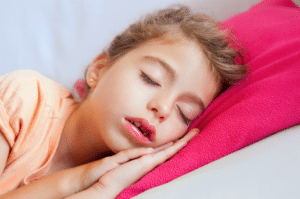
The following symptoms may indicate your child has sleep apnea.
Naps
Although kids might be able to sleep a lot, there comes an age when naps are done away with. If your child takes naps when they’re at the age where naps are no longer necessary (especially as they reach school age), it’s possible they’re not getting the sleep they need. If this is your child, consider further investigation into sleep apnea.
Bedwetting
Kids wet beds–it happens all the time! So how does bedwetting correlate with sleep apnea? If your child is over the age of five and wets the bed at least twice a week, there’s a chance sleep apnea can be involved. Fortunately, treating sleep apnea will usually help stop thee bedwetting.
Teeth Grinding
When soft tissue, such as the tongue, blocks the airway, your body may subconsciously grind your teeth as a way to get some air flowing. Mouthguards can help protect the teeth, but the best thing to do is treat the problem, thus eradicating the issue once and for all.
Mouth Breathing
As humans, we are designed to breathe through our noses. Breathing through the mouth relaxes the jaw muscles, and in the case of children especially, can lead to elongated faces and weaken the tongue, among other things.
Hyperactive Behavior
Kids can be a bit crazy–it’s what they do best! But perhaps all their energy is due, at least in part, to not sleeping well. That may seem counterintuitive, but unlike adults who get tired with too little sleep, children seem to have even more energy! This can hurt their attentiveness, have poor control of their impulses, or become more forgetful. You may also notice their grades suffering. If you’ve noticed any of these behaviors in your child, getting them tested for sleep apnea might be something to consider.
If your child suffers from any of the above symptoms, there is a likelihood that their nighttime sleep routine isn’t as restful as you may have hoped. Your child’s sleep apnea can be alleviated with appropriate orthodontic treatment, so request an appointment with us today for a consultation.
